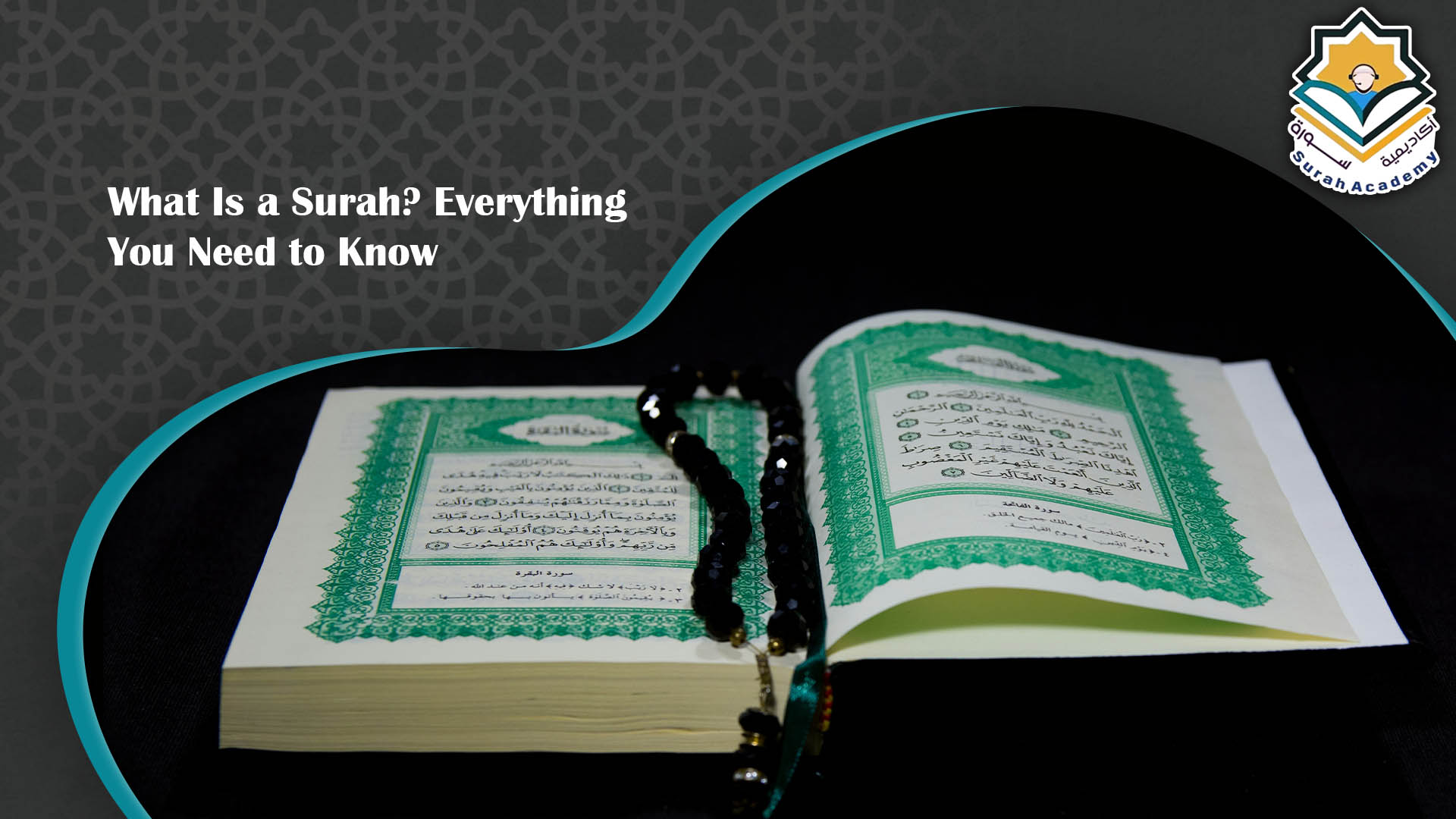Quran Surah is a term that refers to the chapters of the Holy Quran, each carrying deep meanings, divine guidance, and spiritual lessons for humanity. At Surah Academy, students and readers alike are guided through the understanding of these sacred chapters, helping them connect more deeply with the message of Islam.
With 114 Surahs, ranging from the concise and powerful to the detailed and instructive, each one holds a special place in the hearts of Muslims. This article will explore the significance, themes, and impact of various Quran Surahs as taught and explained through the resources offered by Surah Academy.
What Is a Surah? Everything You Need to Know

The word surah is an Arabic term that means “chapter” or “section.” In the Quran, a quran surah refers to one of the 114 chapters that make up the holy book of Islam. These Quran chapters are central to Islamic teachings and are recited daily by millions of Muslims around the world.
If you’re looking to understand the quran surah with meaning, it’s helpful to know that each surah addresses specific themes—such as guidance, morality, faith, law, and the stories of previous prophets. This makes studying each surah essential for anyone wanting to deeply understand the message of the Quran.
The quran surah list starts with Surah Al-Fatiha and ends with Surah An-Nas. The all surah of Quran vary in length; the shortest contains just a few verses, while the longest—Surah Al-Baqarah—includes 286 verses.
Whether you’re reading a full surah online or exploring a translation, each surah offers insights into spiritual life, ethics, and the path to righteousness. Learning the quran surah with meaning can significantly enhance your connection with the Quran and its message.
Features of Our Online Quran Tutor Services
At Surah Academy, we are dedicated to delivering a high-quality, structured Quran learning experience through our team of skilled and experienced online tutors. Our program offers live, interactive classes that enable students to engage with their teachers in real time, fostering a dynamic and supportive educational environment.
We tailor each student’s learning journey with a personalized study plan, designed according to their current level—be it beginner, intermediate, or advanced. This individualized approach ensures that students progress smoothly and effectively, gaining confidence as they work toward their Quranic goals with clarity and expert guidance.

Structure of Surahs
Each Quran surah typically begins with the phrase “In the name of Allah, the Most Gracious, the Most Merciful”—a powerful reminder that the Quran is a divine revelation meant to be approached with reverence, reflection, and humility.
A Quran surah is composed of multiple verses, known as ayahs, which are numbered in sequence. These verses can vary significantly in length, ranging from a single word to several lines. The structure of each surah is carefully arranged to convey spiritual guidance, legal principles, moral teachings, and stories from past prophets.
What Is the Difference Between a Surah and an Ayah?
A quran surah is a chapter of the Quran, whereas an ayah refers to a single verse within that chapter. The length of each quran surah varies significantly, with some containing as few as three verses, while others, like Surah Al-Baqarah, include up to 286 verses. Similarly, ayahs themselves differ in length, ranging from just a single word to multiple sentences.
Understanding the distinction between a surah and an ayah is fundamental for anyone studying the Quran and its structure.
Importance of Daily Recitation of the Quran
Before discussing which quran surah to focus on, it’s important to understand why daily recitation of the Quran is essential for Muslims. Every letter you read from the Quran brings you reward from Allah. Consistent reading not only strengthens your faith but also connects you deeply with the divine message.
Some quran surah hold special benefits—such as protection from evil or bringing peace to the heart. These virtues are supported by authentic Hadiths and the practices of the pious predecessors. Incorporating daily recitation into your routine is a way to gain spiritual blessings and maintain a strong bond with Allah.
Why Are Suras Important?
Quran surah are fundamental to the lives of Muslims because they provide clear guidance and instruction on a wide range of issues, including spirituality, morality, law, and personal conduct. Each surah conveys lessons that help believers navigate life’s challenges while maintaining a strong connection with God.
These chapters are frequently recited during daily prayers, making them an essential part of worship. Additionally, many Muslims memorize entire quran surah as a way to preserve the Quran’s teachings and internalize its messages. This practice strengthens their faith and encourages continuous reflection on the divine wisdom contained within the Quran.
Surahs to Recite Daily
To strengthen your daily Quran reading routine, it is beneficial to regularly recite specific quran surah. Start your mornings and evenings with Surah Al-Ikhlas, Al-Falaq, and An-Nas, which offer divine protection and spiritual shielding. Before going to sleep, recite Surah Al-Kafirun and Surah Al-Mulk to bring peace of mind and safeguard throughout the night.
In addition to these surahs, certain verses are highly recommended. For example, Ayat al-Kursi after every prayer, the last two verses of Surah Al-Baqarah at night, and the final ten verses of Surah Al-Imran upon waking up, all provide additional blessings and protection.
Reciting Surah Al-Kahf on Fridays is also a well-known practice that brings light and protection for the entire week ahead. Incorporating these quran surah and verses into your routine can greatly enhance your spiritual well-being.
Recommended Surahs to Read Every Day
Daily recitation of selected quran surah is a powerful way to gain spiritual rewards, protection, and blessings. These chapters have been emphasized in authentic teachings for their profound benefits and are ideal for strengthening your connection with the Quran.
Many quran surah are recommended in various hadiths to be recited daily for protection, blessings, and spiritual growth:
- Surah Al-Fatihah: Recited in every prayer, it is essential for daily worship and connection with Allah.
- Surah Al-Baqarah (Last 2 Verses): Including Ayat al-Kursi and the final verses, these offer protection from harm and are described as treasures of Paradise.
- Surah Al-Imran (Verses 190-200): Reciting the last verses of Surah Al-Imran at night is said to be equivalent to standing in prayer throughout the entire night.
- Surah Al-Ikhlas (112): Reciting this surah three times equals reading the entire Quran in reward.
- Surah Al-Falaq (113) and Surah An-Nas (114): Known as the Mu’awwidhatayn, these are recited for protection from evil influences.
- Surah Al-Mulk (67): Recommended to be read every night before sleeping, as the Prophet Muhammad (PBUH) said it protects from the punishment of the grave.
- Surah Al-Waqiah (56): Regular recitation is believed to protect against poverty and provide sustenance.
Including these quran surah in your daily routine holds immense spiritual value and helps deepen your connection with the Quran’s divine guidance.
Learn more: quran classes for adults
Learn Tafsir of the Noble Quran Surahs Effectively – Practical Steps

To learn the Tafseer of the Quran effectively, it’s best to begin with shorter quran surah like Surah Al-Fatiha, using beginner-friendly Tafseer resources such as Tafseer As-Sa’di. Studying under a knowledgeable teacher, understanding the historical background of the verses, and learning basic Quranic Arabic will help you grasp the deeper meanings. Reflecting on each verse, taking detailed notes, and enrolling in structured online Tafseer courses can enhance your learning experience. Consistency, sincere intentions, and seeking Allah’s guidance are key to connecting deeply with the Quran’s message.
Interpreting the Quran is not something that comes naturally since every verse must be understood in the context of its revelation. If you want to truly comprehend the meaning of the Quran and wonder how to learn Quran Tafseer, this guide is for you. In this article, we will explain what Tafseer is, explore effective methods to learn it, discuss its different types, and recommend the best online courses for Tafseer study.
Frequently Asked Questions about Quran Surah
Quran Surahs are the foundation of the Holy Quran, offering guidance, wisdom, and spiritual insight to Muslims around the world. Many people have questions about the structure, meaning, and significance of these chapters. Here are some of the most frequently asked questions about Quran Surahs to help you better understand their importance.
1. What is a Surah in the Quran?
A Surah is a chapter of the Quran. There are 114 Surahs in total, each consisting of a varying number of verses (ayahs) that cover different themes and messages.
2. How are Surahs organized in the Quran?
Surahs are not arranged chronologically but rather in a sequence believed to be divinely inspired. The longer Surahs generally appear at the beginning, while shorter ones are found towards the end.
3. Why are Surahs important in daily Muslim life?
Surahs are recited in prayers and memorized for spiritual growth, guidance, and protection. They serve as a connection to God and provide moral and ethical teachings for everyday life.
In conclusion, Quran Surah remains a central element of Islamic faith, offering timeless guidance, wisdom, and spiritual nourishment to believers around the world. Each Surah holds unique lessons that continue to inspire, teach, and strengthen the connection between individuals and their Creator.
Understanding and reflecting on the Quran Surah not only deepens one’s faith but also enriches daily life with purpose and clarity. Through continued study and practice, the messages within these sacred chapters can lead to a more meaningful and fulfilling spiritual journey.
Read more: quran classes online for adults
